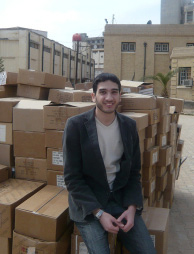This story originally was published in Global KY
Mohammed Saeed, 28, is a physician and a Visiting Fulbright Student at the University of Kentucky, having arrived in Lexington a year and half ago from Baghdad, Iraq. He is currently finishing his final semester of a Masters of Public Health Program, where he focuses on epidemiology, or the study of “the distribution and determinants of disease and injury in human populations.”
Mr. Saeed graduated from the University of Baghdad in 2007, and worked for more than two years as a physician in several hospitals in Baghdad. These and several volunteer experiences, including with an NGO working on health projects, helped him decide to apply for a Fulbright.
The decision to study in the US was not only related to the number of scholarships and opportunities available, but also to the fact that Mr. Saeed’s chosen field of study, public health, is not even offered in Iraqi universities.
“I chose public health because when I was practicing medicine, I realized how essential it is, and how lacking it is in Iraq,” Mr. Saeed said. “No one does public health in Iraq…[T]here are good doctors and nurses and health workers, but the system is not working.”
 pictured left: Mr. Saeed delivering donated medical books to Baghdad Medical College.
pictured left: Mr. Saeed delivering donated medical books to Baghdad Medical College.
On deciding ultimately to concentrate his studies on epidemiology, Mr. Saeed draws on his personal experience with disease epidemics in Baghdad, lamenting, “No one pays attention, no one actually investigates anything. When I worked at the pediatric hospital, we would see a surge in measles cases, but that would be it. We just treat them, we don’t investigate why it’s happening. Or another example, hepatitis – even through just talking to the patients, one could realize most of them come from al-Sadr City, which is an impoverished area of Baghdad, and the water is not clean – that’s why they’re getting hepatitis. But then no one does anything about it.”
One of the reasons these epidemics are ignored, Mr. Saeed mentions, is that these issues sink to the background in the context of news about “explosions and political change”. He recently gave a lecture at UK covering these and other issues – discussing the ‘Recent History of Iraq, US Involvement and War and Current Issues.’
On post-war life, Mr. Saeed keeps a healthy balance of optimism and realism. He points to Iraq’s new political freedom (vs. the old “system of suppression”) and the country’s rising economic status and prosperity. He is glad that Iraqis no longer suffer under Saddam Hussein’s regime, and that the violence during the war, which peaked in 2006 and 2007, has been slowly subsiding. But he laughs when he hears mention of the end of the war, saying, “The war is over to the US, but not to Iraqis – for us, it’s still going on.”
He admits that he and many others in Iraq have become less idealistic over time - largely due to systemic challenges of corruption and poor management - but he still embraces the opportunity that the Fulbright Program has given him to build his skills at the University of Kentucky. As quoted by a recent USA Today article that featured Mr. Saeed, “This is giving us the tools to hopefully fix some of the problems. The more of us that can get this kind of experience, the better Iraq will be.”
Of his experience at the University of Kentucky, Mr. Saeed is very positive. He notes that the academic climate and the relationship between faculty members and students are “very different from what I’m used to in Iraq. The atmosphere is much more casual. The professors are much more helping and concerned – they would approach a student if [they thought] something was wrong. And there are so many resources here to help students.” He pauses and laughs again, saying “Even the campus…a college in Iraq would be surrounded by walls, but here everything’s open.” He has also taken advantage of opportunities outside of UK, including a summer internship at the Center for Disease Control in Atlanta, Georgia last year.
The hope that these and other similar experiences will help to shape the next generation of leaders in Iraq is largely behind a broader national effort to increase the number of Iraqis studying in the US - an effort that reaches to the top echelons of government. “Through efforts like the Fulbright program,” President Obama said in a December press conference, “we’re welcoming more Iraqi students and future leaders to America to study and form friendships that will bind our nations together for generations to come.”
Mohammed Saeed is one of six Visiting Fulbright students at the University of Kentucky for the 2011/12 academic year. There are also three Fulbright scholars who are teaching and/or conducting research at UK. Mr. Saeed is a TA for the Department of Statistics and an RA for the Applied Statistics Lab.
